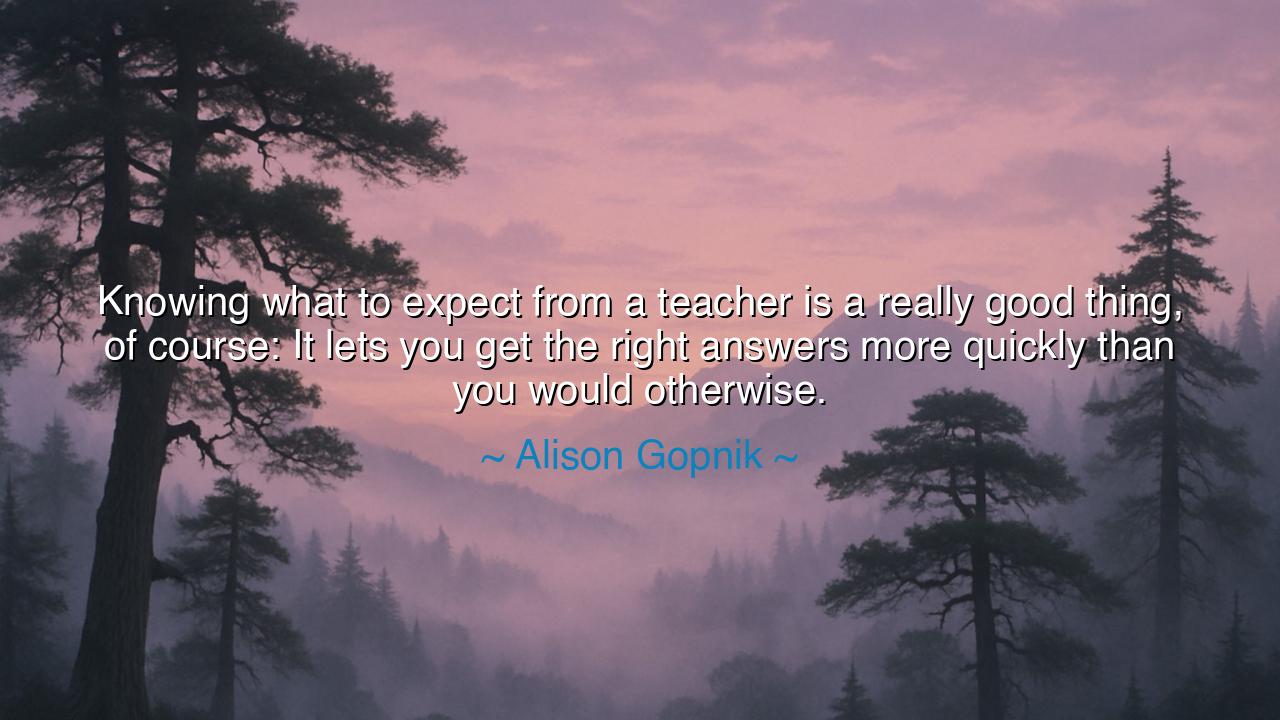
Knowing what to expect from a teacher is a really good thing, of
Knowing what to expect from a teacher is a really good thing, of course: It lets you get the right answers more quickly than you would otherwise.






The words of Alison Gopnik—“Knowing what to expect from a teacher is a really good thing, of course: It lets you get the right answers more quickly than you would otherwise”—sound modest, yet they conceal within them a truth as ancient as learning itself. They remind us that the relationship between teacher and student is not only about knowledge, but about trust, rhythm, and expectation. When a student understands the ways of their guide, they no longer stumble blindly; they move with swifter steps along the path to wisdom. For learning is not only about receiving answers but about discerning how to seek them—and a trusted teacher shapes that search.
The origin of this insight stretches back to the earliest schools of mankind. In the groves of Athens, disciples knew the method of Socrates, who questioned with piercing words until truth revealed itself. To know him was to know that answers came not in gifts but in struggles, in dialogues that stripped falsehood from the soul. Likewise, in the East, students of Confucius knew that their Master prized reverence, order, and clarity. To expect his teaching was to prepare one’s heart for moral correction as much as for intellectual growth. In every age, the student who understood the pattern of the master could grasp truth more swiftly, while the unprepared would stumble as if in darkness.
Consider the story of Aristotle and Alexander the Great. Alexander, though destined for empire, sat at the feet of Aristotle as a youth. He soon learned what to expect from his teacher: precise logic, sharp questioning, and a passion for knowledge that reached from biology to politics. Because he understood the style and method of Aristotle, Alexander absorbed wisdom quickly, arming not only his sword but his mind. His conquests were not only of land but of thought, for he carried his teacher’s lessons into the governance of his vast dominion. Here we see Gopnik’s truth: clarity between teacher and student hastens mastery.
The emotional strength of this quote lies in its simplicity. It tells us that confusion is often not about knowledge itself, but about approach. If a student does not know what a teacher values—whether precision, creativity, obedience, or daring—they waste time guessing, fumbling in uncertainty. But once expectation is understood, effort aligns with guidance, and progress comes like a river flowing in its proper course. There is freedom in such alignment, for the mind no longer wastes itself on shadows, but strives directly toward light.
Yet there is also a deeper lesson here. To know what to expect from a teacher is also to know something of how life itself instructs us. Experience, too, is a teacher, with patterns and rhythms. Those who learn to expect its tests—hardship, failure, loss—advance swiftly to resilience and wisdom. Those who expect life to be indulgent remain forever shocked, unprepared, and delayed. Thus, Gopnik’s words speak not only of classrooms, but of the great school of existence in which we all are pupils.
The lesson for us today is clear: seek to understand the guides in your life. If you learn from a mentor, ask what they value most; if you live within a community, discern its unspoken rules; if you walk with experience, prepare for its inevitable trials. To do so is not submission, but empowerment, for it allows you to move more swiftly toward truth. At the same time, when you stand as a teacher to others, make your expectations known, that those who learn from you may walk with confidence and not with fear.
What, then, shall we do? As students, let us listen not only to the words but to the ways of our teachers, for style is as instructive as substance. As teachers, let us be clear, consistent, and just, so that our pupils may not stumble in uncertainty. And as human beings, let us approach life itself as both teacher and test, expecting hardship yet trusting that in struggle we will find strength. In this way, the wisdom of Alison Gopnik becomes a timeless guide: to know what to expect is to walk faster, straighter, and more boldly on the path of learning.
Thus, her words, though spoken in our age, echo the voice of the ancients: clarity between master and disciple brings swiftness of progress, and understanding expectation is the key to wisdom. For whoever knows the rhythm of their guide will dance with learning, while those who do not will stumble in uncertainty. And so let us be both wise students and wise teachers, hastening the path to truth for ourselves and for all who follow.






AAdministratorAdministrator
Welcome, honored guests. Please leave a comment, we will respond soon